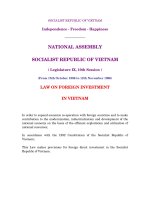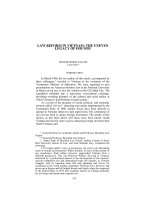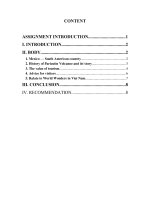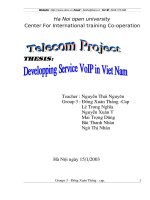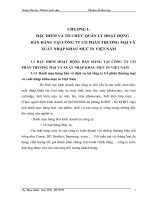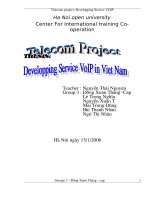Law reform in Viet Nam
Bạn đang xem bản rút gọn của tài liệu. Xem và tải ngay bản đầy đủ của tài liệu tại đây (96.82 KB, 22 trang )
LAW REFORM IN VIETNAM: THE UNEVEN
LEGACY OF DOI MOI
SPENCER WEBER WALLER*
LAN CAO**
INTRODUCTION
In March 1996, the two authors of this article, accompanied by
three colleagues,
1
traveled to Vietnam at the invitation of the
Vietnamese Ministry of Education. We were requested to give
presentations on American business law at the National University
in Hanoi and at one or two law schools in Ho Chi Minh City. The
expedition unfolded into a marvelous crosscultural exchange,
providing revealing glimpses of the cultural and social milieu in
which Vietnam is transforming its legal system.
2
As a result of the program of social, political, and economic
reforms called "doi moi” (meaning renovation) implemented by the
Communist Party in 1986, market forces have been allowed to
operate in Vietnam subject to state supervision. The centerpiece of
doi moi has been to attract foreign investment. The results of this
reform, as this brief article will show, have been mixed: South
Vietnam has had far more success attracting foreign investors than
North Vietnam, and
* Associate Dean for Academic Affairs and Professor, Brooklyn Law
School.
** Associate Professor, Brooklyn Law School.
1. Arthur Pinto of Brooklyn Law School, Andrea Catania of Seton
Hall University School of Law, and Joan Schmidt, Esq., completed the
entourage.
2. No single author's voice or perspective can convey our alternating
sense of wonder and frustration. Where feasible, we have written jointly of
our experiences. Each author, however, approached Vietnam from a
different perspective. This was Professor Waller's first trip to Vietnam,
motivated by a professional interest in the development of the country's
nascent competition law and international trade law regimes, as Vietnam
struggles with its transition from full state planning and strives for
acceptance in the world trading community. Professor Cao, however, had
grown up in Saigon and left behind friends and family when she emigrated
to the United States in 1975. Her academic interest in Vietnam primarily
lay in foreign investment and corporate law.
555
556 INTERNATIONAL LAW AND POLITICS [Vol. 29:555
much of the foreign capital has flowed to the urban areas, leaving
the countryside woefully underdeveloped.
3
Even where development has progressed, however, the legal
and other infrastructure has been inadequate to sustain the needs of
a complex market economy. Furthermore, economic liberalization
has not been followed by the same degree of political liberalization.
Lastly, in pursuit of most-favored-nation [MFN] status, Vietnam has
felt compelled to let the United States dictate the terms of trade,
especially with regard to the enforcement of intellectual property
rights. Vietnam, however, is still a poor country in which a black
market for counterfeit goods thrives, partially because foreign
brand-name goods are simply not affordable to the average citizen.
We prepared this article with three goals in mind. In Section I,
we provide a general sketch of the role which foreign legal experts
play in the law reform of transitional legal systems. In Sections II
and III, we relate, through a series of vignettes, our experiences
lecturing on U.S. law topics to Vietnamese law students and legal
academics and conversing with ordinary Vietnamese citizens.
Lastly, in Section IV, we reflect on the flourishing black market in
consumer products in Vietnam and the futility of the current U.S.
policy of making intellectual property rights enforcement the sine
qua non of its trading relations with Vietnam.
I. THE LAW REFORM BUSINESS
In the West, law reform is booming as both a lucrative legal
practice and a "feel-good" pro bono endeavor. Privatization work
for governments in Africa, Eastern Europe, and Asia is a desirable
aspect of international practice for major corporate law firms both
in Europe and the United States. It is also probably the one type of
law reform practice directly funded by a client. Other funded types
of law reform tend to involve grants by charitable organizations,
academic institutions, foreign governmental aid, or international
agencies. For example, the World Bank funds a number of private
lawyers to pro
3. Most of the foreign investment projects have been concentrated in
Ho Chi Minh City (700 projects), Ha Noi (325 projects), Dong Nai (263
projects), Ba Ria-Vung Tau (65 projects), and Hai Phong (72 projects).
Vietnam Has 2,320 Foreign Investment Projects Under Way, ASIA
PULSE, Feb. 23, 1998, at 1.
1997] LAW REFORM IN VIETNAM 557
vide legal advice as part of its Structural Assistance Program.
4
Similarly, the
United Nations Development Program has funded a multimillion dollar law
reform project in Vietnam.
5
These lawyers typically draft and help implement
commercial and business legislation for countries that are restructuring their
economies toward greater reliance on market forces.
It is more common, however, for a lawyer engaged in the law reform
business to be doing so on his or her own time rather than for a paying client.
Not even governments are above soliciting pro bono advice on draft legislation,
with at least the implicit inducement that contributing firms will enjoy a
preferred position when the time comes to pay for legal advice.
Most governments do not have to solicit pro bono assistance. A
tremendous machinery has developed for providing assistance—whether
requested or not—in proposing, drafting, or critiquing draft constitutional and
legislative provisions. The American Bar Association has an elaborate program
called the Central and Eastern European Law Initiative [CEELI], which provides
comments on draft legislation, conducts seminars for key legal decision makers
in these countries, and sends short-term advisers and long-term consultants to
these countries to advise their governments.
Most of the assistance has been offered on the basis of the foreign
practitioner's specialty. A few professors and judges have offered a broader
perspective on constitutional or judiciary issues, but the majority of law reform
consists of private and government lawyers responding to a foreign initiative in
specialized areas of practice. Commercial law professors and practitioners have
assisted in foreign efforts to develop new commercial codes, asset-based
financing, and payment systems; corporate lawyers have helped with
privatization efforts and legislation permitting new forms of business
organizations; customs lawyers have drafted legislation in their particular field;
andsoon.
4. See generally Jonathan Cahn, Challenging the New Imperial Authority: The
World Bank and the Democratization of Development, 6 HARV. HUM. RTS. J. 159
(1993).
5. See Robert Brown, Legal Reform in Vietnam, 1994 PRIVATE INVESTORS
ABROAD 6-1.
558 INTERNATIONAL LAW AND POLITICS [Vol. 29:555
In the field of competition and foreign investment law, law
reform efforts have been particularly relentless. For substantive,
diplomatic, and symbolic reasons, dozens of countries around the
world have recently promulgated or revised their competition laws,
with a total of more than fifty nations currently having some form
of recognizable antitrust law. An even greater number has adopted
new legal regimes that permit direct foreign investment, but with
varying degrees of liberalization from the prior regimes.
It is not clear whether the United States and the European
Union have created this demand for foreign and comparative law
expertise or merely responded to it. Both have specifically required
countries to adopt competition provisions as a condition of
preferential trading access.
6
Similarly, international organizations
such as the World Bank have conditioned aid on the adoption of
new domestic legislation, often including a competition and foreign
investment element.
7
Other international agencies are content to
offer Western business law as part of a model for development or
participation in the world trading systems.
8
Even the most good-hearted attempts to help with the law
reform business bear substantial risks. For example, the American
Bar Association, through the CEELI program, has provided
opinions on draft legislation throughout the former Soviet Union
and Eastern Europe, especially Albania, Kyrgyzia, Moldavia,
Croatia, and Slovenia. With scant knowledge of the relevant
languages and cultures, law reformers typically operate in a
context-free void. Relying on translations of uncertain quality, they
frequently offer unhelpful sermons on how U.S. and E.U. models
should not be blindly transplanted into a new
6. See Spencer Weber Waller, The Internationalization of Antitrust
Enforcement, 77 B.U. L. REV. 343 (1997).
7. See, e.g., Mark Dutz, Industry and Development Division,
Competition Law to Support Market-Oriented Reform: The Argentine
Context (The World Bank 1992).
8. See A STUDY of THE SOVIET ECONOMY (1991) (Joint study by
Organization for Economic Cooperation and Development, International
Monetary Fund & World Bank offering recommendations for reform of
Soviet economy); Organization for Economic Cooperation and
Development, Council Recommendation on Bribery in International
Business Transactions, reprinted in 33 I.L.M. 1389 (1994); David P.
Fidler, Foreign Private Investment in Palestine: An Analysis of the Law on
the Encouragement of Investment in Palestine, 19 FORDHAM INT'L L.J.
529 (1995).
1997) LAW REFORM IN VIETNAM 559
legal culture, or how the proposed legislation differs from U.S. or
E.U. law.
An additional risk associated with the law reform business is
that Western-style business law may be inappropriate for the
receiving country, whether substantively, procedurally, or because
it may interfere with more critical privatization and
democratization efforts.
9
Both Professor Cao and Professor Waller
have written elsewhere about the danger of presuming the existence
of universal models and that such models are often exported under
the broad rubric of development, economic transformation, or, as in
recent years, privatization.
10
Professor William Kovacic has
discussed the difficulties of promoting long-term, meaningful legal
reform, the likelihood of failure when a foreign law expert
"parachutes" into a foreign legal system for a series of brief visits,
and the dangers of law reform efforts that serve the needs of the
foreign law expert rather than the client.
11
China, for example, has pursued a model of economic reform
wholly different from the path pursued both by the transitional
economies of Eastern Europe and the World Bank's agenda.
12
Given the intersections of various historical, political, and cultural
factors in the Chinese economy, it is doubtful
9. See A.E. Rodriguez & Malcolm B. Coate, Limits to Antitrust Policy
for Reforming Economies, 18 HOUS. J. INT'L L. 311 (1996); A.E.
Rodriguez & Mark D. Williams, A Response to the Effectiveness of
Proposed Antitrust Programs for Developing Countries, 19 N.C. J. INT'L
L. & COM. REG. 233 (1994); James Langerfeld & Marsha Blitzer, Is
Competition Policy the Last Thing Central and Eastern Europe Need?, 6
AM. U. J. INT'L L. & POL’Y 347 (1991).
10. See Lan Cao, The Cat That Catches Mice: China's Challenge to
the Dominant Privatization Model, 21 BROOK. J. INT'L L. 97 (1995),
reprinted in 4 FOREIGNERS IN CHINESE LAW, (Tahirih Lee ed.,
1996); Spencer Weber Waller, Neo-Realism and the International
Harmonization of Law: Lessons from Antitrust, 42 U. KAN. L. REV. 557
(1994).
11. See William E. Kovacic, The Competition Policy Entrepreneur and
Law Reform in Formerly Communist and Socialist Countries, 11 AM. U.J.
INT'L L. & POL’Y 436 (1996); William E. Kovacic, Designing and
Implementing Competition and Consumer Protection Reforms in
Transitional Economies: Perspectives from Mongolia, Nepal, Ukraine,
and Zimbabwe, 44 DEPAUL L. REV. 1197 (1995); William E. Kovacic,
Competition Policy, Economic Development, and the Transition to Free
Markets in the Third World: The Case of Zimbabwe, 61 ANTITRUST L.J.
253 (1991).
12. See generally Philip M. Nichols, Privatization Along the Silk
Road: A Comparison of Privatization Techniques in Central Asia, 29
N.Y.U. J. INT'L L. & POL. 299 (discussing the "Chinese model" of
privatization, which allows privately owned enterprises to thrive alongside
large state-owned enterprises).
560 INTERNATIONAL LAW AND POLITICS [Vol. 29:555
whether the prevailing model of privatization could have been
successfully transferred to China.
13
There is similar futility in
transplanting culturally and historically contingent competition law
to developing countries.
14
The result is often reminiscent of the
1980 film The Gods Must Be Crazy, in which bushmen in the
Kalahari Desert find and come to worship a Coke bottle thrown
from a passing airplane—only later to rid themselves of the evil
object by throwing it off the edge of the world.
II. TRAVEL TO VIETNAM
The purpose of our trip was to contribute to the law reform
movement in Vietnam by offering our expertise on U.S. business
law to law students and legal scholars who will be positioned to
shape the legal infrastructure in the new Vietnam. To determine
which subject areas would be most valuable to our audiences, we
researched the literature on Vietnam's new openness to Western
commerce. Despite its impressive volume, however, the bulk of the
literature consisted of bland newspaper articles on "doing business
in Vietnam." In fact, to our surprise, we uncovered few scholarly
English-language treatments of doi moi.
15
Furthermore, our sponsors were disappointingly un-
forthcoming regarding our precise mission—perhaps because they
themselves were operating somewhat in the dark.
16
We were told to
prepare to lecture for three or four days at the
13. See Cao, supra note 10.
14. See Waller, supra note 10.
15. See Pham Van Thuyt, Legal Framework and Private Sector
Development in Transitional Economies: The Case of Vietnam, 27 LAW
& POL’Y INT'L BUS. 541 (1996); Luke Aloysius McGrath, Vietnam's
Struggle to Balance Sovereignty, Centralization, and Foreign Investment
Under Doi Moi, 18 FORDHAM INT'L L J. 2095 (1995); Brown, supra
note 5; Mark Sidel, The Re-Emergence of Legal Discourse in Vietnam, 43
INT'L & COMP. L.Q. 163 (1994); Mark Sidel, Law Reform in Vietnam:
The Complex Transition from Socialism and Soviet Models in Legal
Scholarship and Training, 11 UCLA PAC. BASIN LJ. 221 (1993).
16. Indeed, we are still not entirely certain about the identity of our
sponsor. The individual who handled all contacts was a Vietnamese
expatriate and co-author of a book on Vietnamese re-education camps.
Most of the correspondence came from "The Vietnam Free Market
Project," an organization which had sponsored a number of past
excursions to Vietnam by U.S. business and law school professors. Our
contact's letterhead, however, indicated an affiliation with the "U.S.-Asia
Management Institute." Whoever the
1997] LAW REFORM IN VIETNAM 561
National University of Hanoi and perhaps for one day at one of the
two law schools in Ho Chi Minh City. Our audiences would consist
of law students, professors, government officials, and perhaps
judges. Based on this limited guidance, we decided to arrange the
curriculum to provide a full-day introduction to the U.S. legal
system, followed by half-day segments on business associations,
the GATT/WTO system, foreign investment, and dispute
resolution.
As the departure date drew near, most of the logistical
arrangements remained unconfirmed and our teaching schedules
remained unsettled. Accommodations had supposedly been made
by the Ministry of Education in Ministry-run hotels, but we had not
been provided with addresses. Our visas did not arrive until two
days before our departure, after multiple pleas to the Vietnamese
embassy in Washington, D.C., and the consulate in New York City,
and after the tendering of an additional "facilitating" payment.
17
Our American sponsor sent fifteen hundred dollars to pay our
Vietnamese liaison who would be our contact for the twelve days in
Vietnam. Thus, we set forth to practice what we had thus far only
preached.
A. Arrival in Saigon
We landed in Saigon’s
18
Tan Son Nhut Airport, which,
according to Professor Cao, had undergone a miraculous
transformation since her 1991 trip. At that time the runway had
been overcome with weeds, and a herd of grazing pigs could be
seen from the airplane. Since then, the runway had been resurfaced
and the herd of pigs had been replaced by a flock of airport buses
sporting an ad that read "Pepsi Cola Welcomes You to Ho Chi
Minh City." We were told that the Vietnamese government had
decided to create a better first impression for the increasing
numbers of foreign visitors.
On the night we arrived, it was 92 degrees and muggy. Casting
our eyes around the terminal, we speculated that air-
real sponsor, it received its funding from the United States Agency for
International Development.
17. Under the exception provided in the Foreign Corrupt Practices Act
of 1977, 15 U.S.C. sec. 78 (ddl-2), facilitating or expediting payment to
secure the performance of a routine governmental action by a foreign
official is exempt from the act's coverage.
18. Everyone, including government officials we met, still calls the city
by its former name.
562 INTERNATIONAL LAW AND POLITICS [Vol. 29:555
ports often mirror the local and national character, recalling the
heavily garrisoned Seoul Kimpo Airport, the unconscious
multiculturalism of Heathrow, and the bedlam of Kennedy
International. Tan Son Nhut smacked of a Stalinist dictatorship. It
was unearthly quiet. Immigration officers sat beneath signs warning
travelers not to leave their money folded inside their passports or
travel papers. Clearing immigration required the production of
exactly one more photo than anyone had told us to bring.
Conveniently, there was a woman with an old Polaroid who took
pictures for $2 in U.S. currency. We watched with curiosity as
customs officers carefully inspected passengers' books and audio
tapes and viewed video tapes on a miniature VCR. Vietnamese
returning from overseas were targeted more regularly than foreign
tourists. Despite the subversive implications of the U.S.
Constitution for a Stalinist state, our law books ended up attracting
no special attention.
It was ten o'clock p.m. when we left the customs area into a
swarm of people yelling to friends and of livery drivers trying to
attract customers. We were greeted by our hosts, two men and a
woman, and loaded our things into their van. Even at this hour,
utter chaos ruled Saigon's streets. There were no traffic lanes, no
visible demarcations, and no double lanes that divided one side of
the street from oncoming traffic. Horns reigned over brakes. Our
driver artfully snaked through traffic, oblivious to the swarms of
bicycles and motorbikes that engulfed us at every traffic stop.
Young couples riding double on motorbikes shouted to friends at
each intersection.
Our hotel turned out to be a no-frills affair. The bedroom was
sparse and clean, but completely lacking in the usual amenities
most non-backpackers over thirty would prefer. We later moved to
a more centrally located hotel, the Rex, known before the fall of
Saigon as a charming, colonial-era hotel frequented by Americans
for its roof-top pool and bar. The hotel was attractively appointed
in a style combining traditional regional Vietnamese decors and
provided a level of service matching if not surpassing the best
luxury hotels of the West.
B. Trip to the Mekong Delta
One of our two male hosts picked us up at five o'clock the
next morning to take us on a tour of Long Xuyen, a province in the
Mekong Delta, where Professor Cao's uncle happened

